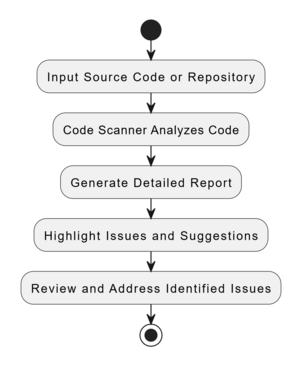Code Scanner
Comprehensive static code analysis to identify potential issues, vulnerabilities, and areas for improvement in your codebase.
Key Features
-
Static Analysis: The feature performs in-depth analysis of your code to identify potential issues, vulnerabilities, and areas for improvement.
-
Multi-language Support: Code Scanner can analyze code in various programming languages and frameworks.
-
Detailed Reporting: Generates comprehensive reports highlighting issues, potential bugs, and suggestions for improvement.
-
Security Vulnerability Detection: Identifies potential security vulnerabilities in the codebase.
-
Code Quality Metrics: Provides metrics and insights on code quality and maintainability.
How it Works
- Input your source code or provide access to your repository.
- The Code Scanner employs advanced algorithms and AI to analyze the code and generate a detailed report of findings.
- The scanner identifies potential issues, vulnerabilities, and areas for improvement in your codebase.

You can find an example here (opens in a new tab)
Usage Guide
Here's a detailed step-by-step guide on how to use the Code Scanner:
-
Follow the initial setup guide here.
-
Create a new Python file and import the necessary modules from Kaizen:
from kaizen.reviewer.code_scan import CodeScanner from kaizen.llms.provider import LLMProvider import json -
Create an instance of the CodeScanner:
reviewer = CodeScanner(llm_provider=LLMProvider()) -
Provide the source code file or directory path which you want to scan:
You can scan a single file at a time:
filename = "path/to/your/file.py" with open(filename, "r+") as f: file_data = f.read() review_data = reviewer.review_code(file_data=file_data, user="YourUsername/ProjectName")Or a whole directory:
dir_path = "path/to/your/directory/" review_data = reviewer.review_code_dir( dir_path=dir_path, reevaluate=True, user="YourUsername/ProjectName" ) -
Display the test results:
print(f"Total {len(review_data.issues)} Issues found!!!!") print(json.dumps(review_data.issues, indent=2)) -
Review the generated report and address the identified issues in your code.
Example
Here's a complete example to generate unit tests for a specific file:
from kaizen.reviewer.code_scan import CodeScanner
from kaizen.llms.provider import LLMProvider
import json
# Create an instance of the CodeScanner
reviewer = CodeScanner(llm_provider=LLMProvider())
# Scan a single file
filename = "github_app/main.py"
with open(filename, "r+") as f:
file_data = f.read()
review_data = reviewer.review_code(file_data=file_data, user="Example/CodeScan")
# Scan a whole directory
dir_path = "github_app/"
review_data = reviewer.review_code_dir(
dir_path=dir_path, reevaluate=True, user="Example/CodeScan"
)
# Display the results
print(f"Total {len(review_data.issues)} Issues found!!!!")
print(json.dumps(review_data.issues, indent=2))Supported Languages
- All programming languages
Benefits
- Early Bug Detection
- Security Vulnerability Identification
- Code Quality Improvement
- Coding Standard Enforcement
- Technical Debt Reduction
Limitations
- False Positives: Some identified issues may not be actual problems in certain contexts.
- Language Coverage: Effectiveness may vary depending on programming language and framework.
- AI Limitations: May not catch all possible issues or understand complex project-specific requirements.